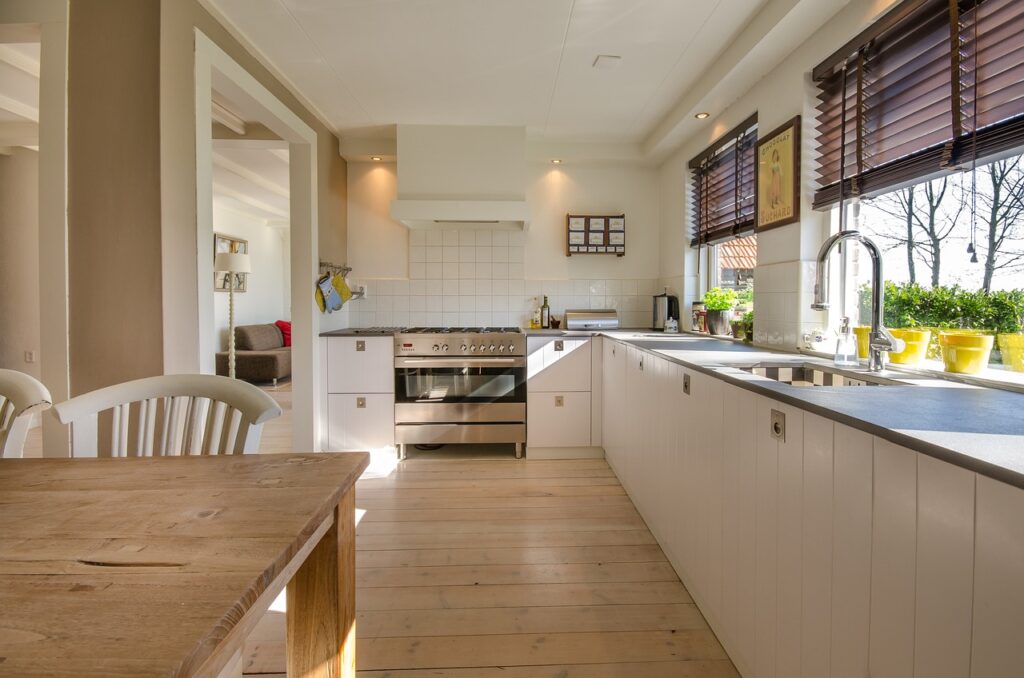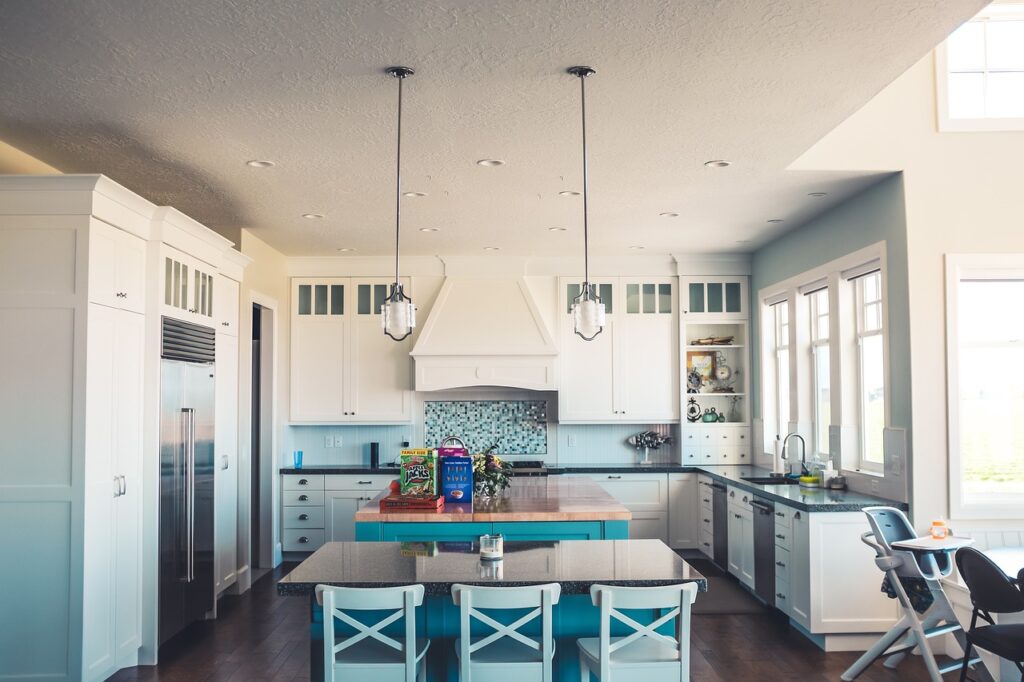As an Amazon Associate I earn from qualifying purchases.
Have you ever wondered what the effect of oven cleaner is on kitchen countertops? This post will explore the potential impact of using oven cleaner on different types of kitchen countertops, and provide recommendations for safe and effective cleaning methods. Whether you have granite, quartz, laminate, or another type of countertop, it’s important to understand how certain cleaning products may affect the surface. Stay tuned to learn more about how to keep your kitchen countertops clean and well-maintained.

Types of Kitchen Countertops
When it comes to using oven cleaner on kitchen countertops, it’s important to consider the type of material your countertops are made of. For example, granite and quartz countertops are generally safe to clean with oven cleaner, but it’s always best to spot test in a small, inconspicuous area first.
However, it’s important to avoid using oven cleaner on laminate countertops, as the harsh chemicals can cause damage to the surface. For marble countertops, it’s best to use a mild cleaning solution specifically designed for that type of stone. For solid surface, butcher block, concrete, and stainless steel countertops, it’s best to follow the manufacturer’s recommendations for cleaning and maintenance.
Overall, it’s important to always read the labels on cleaning products and consult with a professional if you’re unsure about the best way to clean your specific type of kitchen countertop.
Factors to Consider When Choosing Kitchen Countertops
When choosing kitchen countertops, it’s important to consider factors such as durability, maintenance requirements, aesthetic appeal, budget considerations, and compatibility with your kitchen design and style.
Different types of countertops require different cleaning methods, so it’s important to understand the potential impact of using oven cleaner on your specific type of countertop material. For example, while granite and quartz countertops are generally safe to clean with oven cleaner, laminate countertops can be damaged by harsh chemicals.
It’s always best to read the labels on cleaning products and consult with a professional if you’re unsure about the best way to clean your specific type of kitchen countertop. By considering these factors and using the appropriate cleaning methods, you can keep your kitchen countertops clean and well-maintained for years to come.
Pros and Cons of Different Countertop Materials

There are several different countertop materials to consider, each with its own pros and cons. Granite countertops are known for their durability and heat resistance, but they can be expensive and require regular sealing to prevent staining. Quartz countertops are low-maintenance and resistant to stains, but they can be sensitive to heat and may not be as durable as granite.
Marble countertops are elegant and heat-resistant, but they are prone to scratching and staining. Laminate countertops are affordable and come in a wide variety of colors and patterns, but they can be easily scratched and damaged by heat. Solid surface countertops are seamless and easy to clean, but they can be susceptible to scratches and burns. Butcher block countertops add warmth and a natural look to the kitchen, but they require regular maintenance and can be easily damaged by moisture. Concrete countertops are durable and customizable, but they can be prone to cracking and staining. Stainless steel countertops are sleek and easy to clean, but they can be noisy and show scratches easily.
It’s important to consider these factors when choosing a countertop material that best fits your needs and lifestyle. Always consult with a professional if you’re unsure about the best type of material for your kitchen countertops.
Installation Process
When it comes to installing different types of countertops, it’s important to consider the unique characteristics and maintenance needs of each material. Laminate countertops are a popular and affordable option, but they are susceptible to scratches and heat damage. Solid surface countertops offer a seamless appearance and easy cleaning, but they can also be prone to scratches and burns.
Butcher block countertops provide a warm and natural look, but they require regular maintenance and are vulnerable to moisture damage. Concrete countertops are durable and customizable, but they may be prone to cracking and staining. Stainless steel countertops are sleek and easy to clean, but they can be noisy and show scratches easily.
It’s crucial to carefully consider these factors and choose a countertop material that best fits your needs and lifestyle. Additionally, it’s highly recommended to consult with a professional for the installation process. Hiring a professional ensures that the countertops are installed correctly and securely, minimizing the risk of damage or issues in the future.
Professional installers have the expertise and tools needed to handle the specific requirements of each countertop material, providing a high-quality and long-lasting installation. So, always consult with a professional to ensure that your chosen countertop material is installed properly and to the highest standards.
Maintenance Tips for Kitchen Countertops
When it comes to maintaining kitchen countertops, there are a few important tips to keep in mind. Different materials have different maintenance needs, so it’s crucial to understand the specific requirements for the type of countertop you have. Butcher block countertops, for example, require regular maintenance and are vulnerable to moisture damage.
Concrete countertops are durable but may be prone to cracking and staining, while stainless steel countertops are sleek and easy to clean but can show scratches easily. It’s important to choose a material that best fits your needs and lifestyle. Additionally, consulting with a professional for the installation process is highly recommended. Professional installers have the expertise and tools needed to handle the specific requirements of each countertop material, providing a high-quality and long-lasting installation.
In terms of maintenance, daily cleaning routines, stain removal techniques, sealant application for certain materials, and preventive measures to avoid damage are all important factors to consider. By following these tips, you can ensure that your kitchen countertops remain in great condition for years to come.
Repair and Restoration
When it comes to kitchen countertops, it’s important to understand the specific maintenance and repair needs of different materials. Butcher block countertops, for example, require regular maintenance and are vulnerable to moisture damage.
Concrete countertops are durable but may be prone to cracking and staining, while stainless steel countertops are sleek and easy to clean but can show scratches easily. It’s important to choose a material that best fits your needs and lifestyle. Additionally, consulting with a professional for the installation process is highly recommended.
Professional installers have the expertise and tools needed to handle the specific requirements of each countertop material, providing a high-quality and long-lasting installation. In terms of maintenance, daily cleaning routines, stain removal techniques, sealant application for certain materials, and preventive measures to avoid damage are all important factors to consider. By following these tips, you can ensure that your kitchen countertops remain in great condition for years to come.
Trends in Kitchen Countertops
The current trends in kitchen countertops are leaning towards more sustainable and eco-friendly options. Materials such as recycled glass, bamboo, and reclaimed wood are becoming popular choices for homeowners who want to minimize their environmental impact. In terms of colors and designs, neutral tones such as white, gray, and beige are in high demand, as they provide a timeless and versatile look that can easily match any kitchen decor.
When choosing a countertop material, it’s important to consider the maintenance and durability of each option. For example, butcher block countertops require regular maintenance and are vulnerable to moisture damage. On the other hand, concrete countertops are durable but may be prone to cracking and staining. Stainless steel countertops are sleek and easy to clean, but they can show scratches easily. It’s important to choose a material that best fits your needs and lifestyle.
Additionally, consulting with a professional for the installation process is highly recommended. Professional installers have the expertise and tools needed to handle the specific requirements of each countertop material, providing a high-quality and long-lasting installation. In terms of maintenance, daily cleaning routines, stain removal techniques, sealant application for certain materials, and preventive measures to avoid damage are all important factors to consider. By following these tips, you can ensure that your kitchen countertops remain in great condition for years to come.
Conclusion
It is important to carefully consider the type of kitchen countertop you have when using oven cleaner. Harsh chemicals in oven cleaner can damage certain types of countertops, so it’s crucial to follow the manufacturer’s guidelines and use a gentle, non-abrasive cleaner to avoid any potential damage. Taking proper care of your countertops will ensure they remain in good condition for years to come.
As an Amazon Associate, I earn from qualifying purchases
Leave a Reply